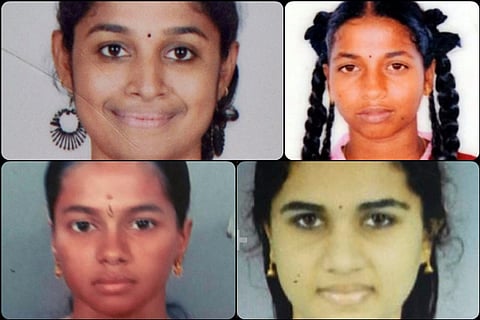

Women are facing a serious problem that states and society are refusing to acknowledge – that of violent stalkers. Recent cases from Tamil Nadu shows us how deep this problem runs.
On Wednesday, Dhanya, a woman residing in Coimbatore, was the latest to fall victim to a stalker. Zahir, a Malayali man working in a Tirupur factory, entered Dhanya’s house at around 8pm on Wednesday when she was alone at home, and hacked her to death with a knife.
In the last four months alone, five women have been killed in the state by men whose advances they rejected. The most notorious of these murders was that of Swathi, a techie working in Infosys, Chennai, who was hacked to death in broad daylight on the platform at Nungambakkam Railway Station.
While reams of analysis and opinion were written on Swathi’s murder, it seems that the media attention generated by her murder did not manage to convey a strong message. A few weeks after the incident, reports emerged of two incidents in Chennai where stalkers were using Swathi’s example to intimidate the women they were stalking, threatening that they would kill them the same way.
Such violence is not a problem restricted to Chennai alone. In Villupuram, a young school student, Naveena, who dreamed of becoming a nurse, was killed in August by Senthil (32), who stalked her.
Senthil entered Naveena’s house when she was alone, and tried to set her on fire. When that failed, he set himself on fire and grabbed hold of her, setting her alight, and killing both of them.
Read Naveena’s story here.
Later that month, a 24-year-old teacher was hacked to death in a church in Thoothukudi by a man whose advances she had rejected.
On August 31, 19-year-old engineering student Sonali was bludgeoned to death in her classroom in Karur district. 21-year-old Udhayakumar barged into her classroom and picked up an argument with her, before bludgeoning her with a broken wooden log he found nearby. He also attacked a professor and some other students who came to Sonali’s rescue. He was her former student and friend with whom she had reportedly broken off communication.
One of the points that was made repeatedly in the aftermath of Swathi’s murder was the sense of entitlement with which men approach women in our society and their inability to take no for an answer.
A peculiar sense of worth pervades this sense of entitlement, where women’s consent is considered relatively immaterial if the man’s love is believed to be “true” and therefore deserving of reciprocation. Much victim-blaming occurs as a result, where women are repeatedly chastised for being fickle and duplicitous for rejecting men who “truly” love them. Tamil cinema’s role in the issue has been highlighted as well, as film after film glorifies stalking as the best means to ‘win’ a woman’s affection.
Five murders in four months may not seem like a large number compared to the over 30,000 murders that get reported each year. But the larger picture may not have appeared in public attention because crime statistics disaggregated on this specific question are not available, although the National Crime Records Bureau records that 1,359 murders occurred in 2015 over “love affairs”.
But irrespective of the number, the continuing occurrence of such crimes urges us to consider that a public conversation on gender inequality is a growing necessity. When the TN government finds the resources to provide everything from cement to salt to garments and nail polish to even fitness centres, perhaps it could find the resources for concerted campaigns on gender crimes.
And educationists need to do their part. But forget conversations about gender and relationships, at present most educationists do not even allow the two genders to talk to each other. In such circumstances, it’s not hard to see why skewed notions about love and women continue to exist in Tamil Nadu.
And it’s easy to see that without such systematic efforts to tackle the situation at a public level, the Dhanyas and Swathis of Tamil Nadu continue to be at risk.